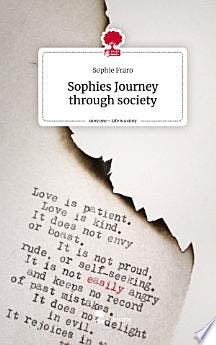- Published on
Sophies Journey through society. Life is a Story - story.one
- Authors

- Name
- Sophie Fraro
- @search?q=Sophie Fraro

Overview
At its core, Sophie's World takes readers on a journey through the major epochs of philosophical inquiry, from the ancient Greeks to the modern era, all woven into the curious life of a teenager, Sophie Amundsen. The book is structured around Sophie receiving letters from a mysterious philosopher, Alberto Knox, who gradually becomes her mentor in the philosophical world.
Themes and Philosophy
The book covers a wide range of philosophical themes, including but not limited to:
- The nature of reality
- Questions about existence
- The development of Western thought
- The impact of philosophy on human understanding and the natural world
Each chapter delves into the thoughts and contributions of significant philosophers such as Socrates, Plato, Aristotle, Descartes, Spinoza, Kant, Hegel, and many others, making complex ideas accessible and engaging.
Narrative Structure
The narrative ingeniously blends the historical progression of philosophical ideas with the personal growth of Sophie as she begins to see her own world in a new light. This dual narrative structure not only educates but also entertains, as readers are pulled deeper into the mystery of who is sending these letters to Sophie and why.
Impact and Reception
Since its publication, Sophie's World has received acclaim for making philosophy accessible to a younger audience and for its inventive narrative structure. It has been celebrated as a novel that challenges its readers to question their surroundings and their existence, encouraging a deeper understanding of their place in the world.
Conclusion
Jostein Gaarder's Sophie's World is more than just a novel or a simple introduction to philosophy; it is a profound exploration of the curious mind of a young girl and through her, our eternal quest for knowledge and understanding. It's a must-read for anyone looking to embark on a philosophical journey through time.
